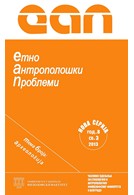Koncept romanizacije Teodora Momzena i njegova uloga u konstituisanju rimskih arheologija Zapadnog Balkana
The Concept of Romanization and its Role in the Constitution of the Classical Archaeologies of the Western Balkans
Author(s): Marko JankovićSubject(s): Archaeology, Customs / Folklore, Studies of Literature, Recent History (1900 till today), Cultural Anthropology / Ethnology, Methodology and research technology
Published by: Филозофски факултет, Универзитет у Београду
Keywords: Classical archaeology; Romanization; Theodor Mommsen; Croatia; Serbia; history of the discipline;
Summary/Abstract: The traditional concept of Romanization has heavily influenced the methodology of research of the Roman monuments in Europe. The basic principles of the concept have been laid out by Theodor Mommsen, the German historian and an expert in epigraphy, who was the first to define the relationships between the Roman "civilization" and the local populations in his book The History of Rome. Mommsen presents a process in which two different political, economic and technological communities meet, and the inferior one is inevitably assimilated. Through the adoption of language, script, customs and material culture, the local communities become more Roman, i.e. they are romanized. This paradigm framework has fundamentally changed the way in which the researchers approach the Roman past. This was the first time that the material culture was explained inside archaeology as the discipline associated to history. The introduction of the concept of Romanization enabled the scholars to analyze the material culture in the context of everyday activities, regardless of their artistic value. Although this concept is a largely simplified view of the past, it has marked the Roman archaeology throughout the 20th century. At the moment when Mommsen's ideas are accepted and elaborated in Western Europe, the discipline of archaeology is formed in the Balkans, the first researchers are trained and the first modern archaeological researches are launched. The paper analyses the influence of his ideas upon the formation of Classical archaeology in Croatia and Serbia, two significantly different political contexts.
Journal: Етноантрополошки проблеми
- Issue Year: 8/2013
- Issue No: 3
- Page Range: 747-762
- Page Count: 16
- Language: Serbian

